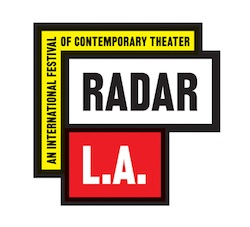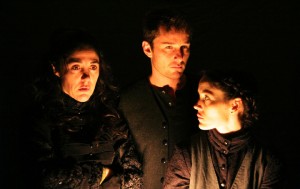
When a festival opens on as brilliantly shattering a note
as the RADAR L.A. FESTIVAL did on Tuesday night with Neva, expectations for the rest of the festival run very high indeed. From Chile’s Teatro en El Blanco, vividly written and directed by Guillermo Calderón, who is the company’s leader, Neva brings a jolt of artistic purity to Los Angeles which should force us to look again at what art is all about. In a dimly lit rehearsal room of a St. Petersburg theater, Calderón imagines a drama in which Chekhov’s widow, Olga Knipper, has come from Moscow to perform one of her late husband’s great works (it’s The Cherry Orchard – or, given the allusions referred to, is it Three Sisters?), only to discover that she and one other actor are the only ones to show up because, outside the doors of the theater, the Czarist massacre of the revolutionaries has begun, perhaps killing the other members of the company who were en route to rehearsals. Knipper herself seems immune to the experience that will change forever the world as she knows it, a world her husband knew was coming even if she didn’t, and her first monologue is an increasingly hilarious (subtitles are provided) dissertation of the narcissism of actors.  A bourgeois actor, Aleko, sits at the feet of the great actress, admiring her, perhaps in love with her as a neophyte would fall in love with the star he is playing against. Eventually, bundled up against the blistering cold and the madding crowds, a third actor, Masha, enters with news from the front. Together, the three of them re-enact the possible ways in which the tubercular Chekhov has died, expand on their notions of acting, display their passions – Olga for her life and her theater, Aleko for his sexual desire, Masha for the revolution she believes in – all with grandly comic results. But, ultimately – and one is not giving anything away here, since, as in most great theater, it is in what takes place on the tiny part of the stage that the actors have allotted themselves – the only corner in which there is any light – that the drama takes place, a drama that reaches a crescendo of revolutionary fervor and passion. By the end, we are no longer in St. Petersburg: we are perhaps in Chile or wherever people try to create theater while the world is falling apart. Which is more important? The magic we give to audiences? The omnipresent real world that makes theater invention sheer canard? Can theater illuminate the real terrors outside as it illuminates the work of art in rehearsal? Masha’s final speech reverberates through the theater with manic clarity, at once hilarious and ultimately terrifying. One’s notions of what theater is are shaken. And, at the same time, we have, of course, experienced an extraordinary piece of theater. The actors – Trinidad González, Jorge Becker, and Mariana Muñoz – are incredibly young, but the lives they convey are ageless and timeless. The eighty minutes of Neva come at you with the shock that comes when poetry and politics walk hand in hand. And the language we hear is a magnificent fabrication, in which Spanish and the sense of translated Russian intertwine in intensely scabrous and human ways. Neva knows that laughter is good for the soul, but horror is better.
A bourgeois actor, Aleko, sits at the feet of the great actress, admiring her, perhaps in love with her as a neophyte would fall in love with the star he is playing against. Eventually, bundled up against the blistering cold and the madding crowds, a third actor, Masha, enters with news from the front. Together, the three of them re-enact the possible ways in which the tubercular Chekhov has died, expand on their notions of acting, display their passions – Olga for her life and her theater, Aleko for his sexual desire, Masha for the revolution she believes in – all with grandly comic results. But, ultimately – and one is not giving anything away here, since, as in most great theater, it is in what takes place on the tiny part of the stage that the actors have allotted themselves – the only corner in which there is any light – that the drama takes place, a drama that reaches a crescendo of revolutionary fervor and passion. By the end, we are no longer in St. Petersburg: we are perhaps in Chile or wherever people try to create theater while the world is falling apart. Which is more important? The magic we give to audiences? The omnipresent real world that makes theater invention sheer canard? Can theater illuminate the real terrors outside as it illuminates the work of art in rehearsal? Masha’s final speech reverberates through the theater with manic clarity, at once hilarious and ultimately terrifying. One’s notions of what theater is are shaken. And, at the same time, we have, of course, experienced an extraordinary piece of theater. The actors – Trinidad González, Jorge Becker, and Mariana Muñoz – are incredibly young, but the lives they convey are ageless and timeless. The eighty minutes of Neva come at you with the shock that comes when poetry and politics walk hand in hand. And the language we hear is a magnificent fabrication, in which Spanish and the sense of translated Russian intertwine in intensely scabrous and human ways. Neva knows that laughter is good for the soul, but horror is better.
harveyperr @ stageandcinema.com
photo by Valentina Newman
RADAR L.A. FESTIVAL
Teatro en El Blanco’s Neva
at REDCAT
ends Saturday June 18
for tickets, visit http://www.redcat.org/event/radar-la-festival
